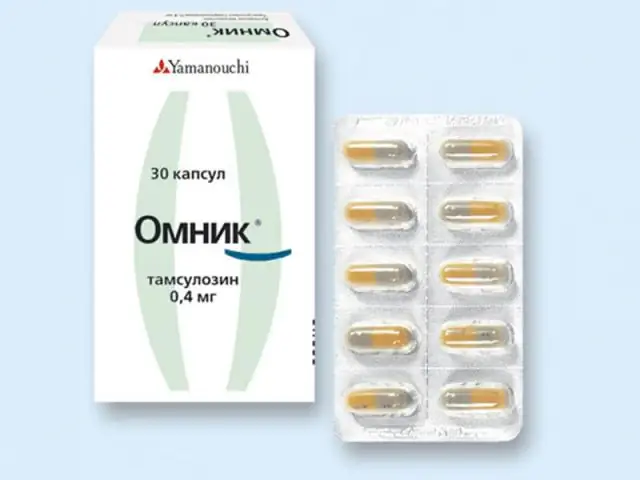- Author Rachel Wainwright wainwright@abchealthonline.com.
- Public 2023-12-15 07:39.
- Last modified 2025-11-02 20:14.
Growth hormone: how to increase hormone levels
The content of the article:
- Increased levels of growth hormone
- Decreased levels of growth hormone
- How to determine the level of growth hormone
- How to boost growth hormone naturally
Growth hormone is produced by cells of the anterior pituitary gland (somatotrophs) under the control of hypothalamic factors - somatostatin and somatoliberin. It promotes the growth of bones, soft tissues, internal organs and muscle tissue, affects carbohydrate and lipid metabolism. Acting through somatomedins (insulin-like growth factors synthesized in the liver and other tissues in response to the action of somatotropic hormone), somatotropic hormone accelerates the synthesis of amino acids and their inclusion in the protein molecule, and reduces the level of urea.

Growth hormone plays an important role in the body, primarily, ensuring its growth
Synonyms: somatropin, growth hormone, growth hormone, growth hormone.
The main functions of growth hormone:
- stimulation of bone and soft tissue growth;
- increased glycogenesis in the liver;
- activation of protein synthesis in the liver and muscles;
- utilization of glucose in tissues;
- anti-insulin effect (decrease in the sensitivity of cells to insulin);
- stimulation of fat breakdown;
- anti-catabolic action (inhibition of protein breakdown);
- participation in collagen synthesis;
- regeneration of damaged tissues, wound healing;
- retention of potassium and sodium in the body;
- an increase in calcium absorption in the intestine and its absorption by bone tissue;
- immunostimulating effect (increase in the number of T-lymphocytes);
- stimulation of fluid excretion through sweat glands;
- control of cholesterol levels.
The secretion of growth hormone is of a pulsating nature, its level in the blood changes during the day. Production peaks at night, at the beginning of the deep sleep phase.
Growth hormone is synthesized throughout life. Its secretion is maximum in early childhood, during puberty, the highest content of growth hormone in the blood is observed, and production gradually decreases with age.
The rate of growth hormone depends on the age and gender of the person:
- newborns: 5-53 mcg / l;
- children under 1 year old: 2-10 mcg / l;
- older children and adolescents: 1-20 mcg / l;
- women under 60 years old: 0-18 mcg / l, over 60 years old: 1-16 mcg / l mcg / l;
- men under 60: 0-4 mcg / l, over 60: 1-9 mcg / l.
An excess or deficiency of somatotropin causes metabolic disturbances and leads to the development of serious pathologies. Both with a decrease and with an increase in the level of growth hormone, changes in lipid and carbohydrate metabolism occur. Hormonal disruption negatively affects the entire body.
Increased levels of growth hormone
The increased production of growth hormone from the pituitary gland leads to continued growth of bones and soft tissues after the end of puberty. If the disease begins at an early age, then gigantism occurs, if at a mature age - acromegaly. With acromegaly, there is a thickening of the hands and feet, enlargement of facial features, and an increase in the size of internal organs. The disease is accompanied by neurological disorders, disorders of the cardiovascular system.

Increased production of STH in adulthood leads to the development of acromegaly
Increased production of the growth hormone of the pituitary gland also occurs in the following diseases and conditions:
- chronic renal failure;
- Laron's syndrome;
- hyperpituitarism;
- pituitary adenoma;
- nervous anorexia;
- hypoglycemia;
- hyperinsulinemia;
- post-traumatic and postoperative conditions.
An increase in the level of growth hormone in the blood can be caused by taking medications (insulin, glucagon, estrogens, dopamine, corticotropin, norepinephrine, serotonin, alpha-adrenergic receptor stimulants, beta-adrenergic receptor antagonists, bromocriptine, arginine, vitamin PP).
Decreased levels of growth hormone
A decrease in the synthesis of growth hormone occurs due to a genetic predisposition (chromosomal diseases, hereditary dwarfism, congenital metabolic defects, pathology or injury, Down, Turner, Noonan syndromes).

Decreased GH synthesis is the cause of pituitary dwarfism
Growth hormone deficiency causes stunted growth or puberty in children. Growth failure is the main reason for the development of pituitary dwarfism, characterized by a sharp lag in the growth and physical development of the child.
The causes of somatotropic insufficiency can be:
- intracranial tumors, including pituitary;
- cysts of the pituitary gland of the brain;
- underdevelopment of the pituitary gland;
- hypopituitarism syndrome;
- infectious and toxic damage to the central nervous system;
- hyperfunctionality of the adrenal cortex (Itsenko-Cushing's syndrome);
- radio and chemotherapy;
- side effects of certain drugs [progesterone, glucocorticoids, alpha-adrenergic receptor antagonists, beta-adrenergic receptor stimulants (Isoproterenol), serotonin receptor antagonists (Metisegrid), dopamine receptor antagonists (Phenothiazide), somatostatin, Probucol, glucocorticosteroid.]
A decrease in the level of growth hormone in adults is accompanied by metabolic disorders, hypoinsulinemia, and disorders in the thyroid gland.
Symptoms of growth hormone deficiency:
- a decrease in the mass and strength of skeletal muscles, muscle atrophy;
- decrease in bone mass, fragility of bones, joints, ligaments;
- increased deposition of fat on the body;
- hair loss;
- dry, thin skin;
- increased sweating, especially during a night's sleep;
- chronic fatigue, low motivation;
- memory impairment, problems with concentration and attention;
- depression, anxiety;
- hypoglycemia;
- disorders of the cardiovascular system, depletion of the heart muscle;
- erectile dysfunction in men, decreased libido in women.
How to determine the level of growth hormone
The concentration of growth hormone levels in normal conditions varies widely, the secretion of the hormone is affected by periods of sleep and wakefulness, exercise, stress, hypoglycemia, and the production or use of corticosteroids and estrogens. After a meal, the level of growth hormone decreases sharply, and on the second day of fasting it increases by about 15 times.
A single determination of the level of somatotropic hormone has no diagnostic value; the average value of three determinations within 2-3 days is used for the diagnosis.
To detect the level of growth hormone, samples with insulin, clonidine, STG-RF (growth hormone release factor), arginine, glucagon, levodopa, pyridostigmine are used. To clarify the diagnosis, the tests are repeated at intervals of several months.
X-ray examination of the skull is carried out in order to visualize the shape and size of the sella turcica and the state of the skull bones, which makes it possible to reveal the pathology of the pituitary gland. For the same purpose, computer and / or magnetic resonance imaging of the brain can be used.
How to boost growth hormone naturally
Growth hormone inhibits the aging process, improves the contractile function of the heart, normalizes the functions of the liver and kidneys, increases bone mineral density and muscle tone.
The impact on the physiological mechanisms of regulation of the production of growth hormone by some natural factors, you can maintain the optimal level of somatropin. The best way to boost its production is by adjusting your lifestyle and diet.
Ways to increase the concentration of growth hormone in the body:
- regular physical activity;
- balanced diet;
- full sleep;
- cold and hot shower.
To stimulate the synthesis of growth hormone, a combination of strength and aerobic exercise is considered optimal. It is recommended to train at least three times a week. The increase in the level of growth hormone begins after 15 minutes of training, and its maximum concentration is observed by the end of the training. If it is not possible to regularly work out in the gym, you can jog or walk at an active pace daily.

Regular exercise, such as brisk walking, normalizes growth hormone synthesis
A properly formulated diet plays an important role in maintaining the health of the body in general, and the endocrine system in particular. To activate the production of growth hormone, a low-carbohydrate diet is prescribed - foods with a high glycemic index are excluded from the diet, while enriching it with proteins (they contain amino acids that stimulate the production of somatotropin). It is recommended to eat meat and dairy (fermented milk) products, fish, eggs, nuts, legumes.
Night sleep plays a very important role in the normalization of hormonal levels. For the normal synthesis of growth hormone, it is necessary that uninterrupted sleep lasts at least 8 hours.
Temperature fluctuations have a positive effect on the regulation of somatotropin production processes, therefore a contrast shower is recommended for patients with STH deficiency.
YouTube video related to the article:

Anna Kozlova Medical journalist About the author
Education: Rostov State Medical University, specialty "General Medicine".
Found a mistake in the text? Select it and press Ctrl + Enter.






